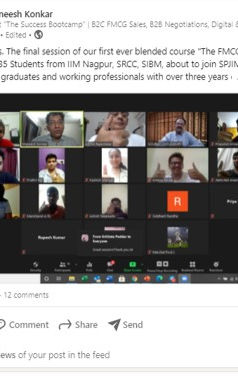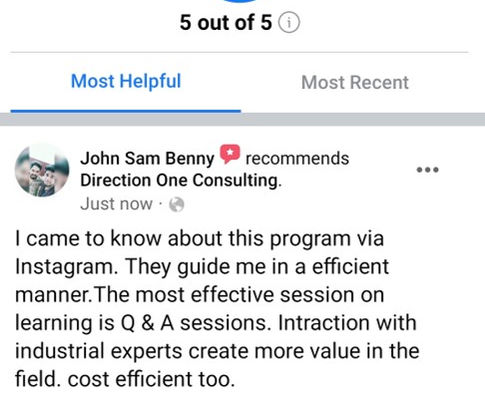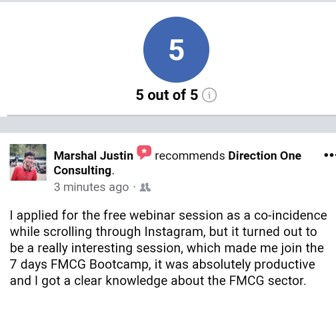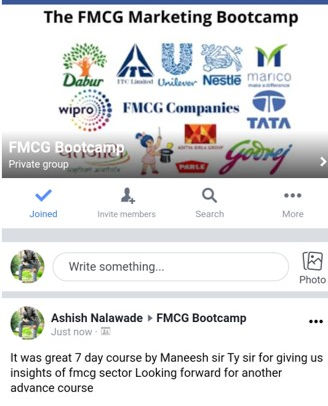Kickstart your marketing career with this comprehensive 20+ hours FMCG sales & marketing course
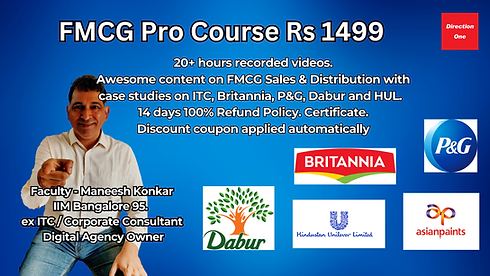
FMCG Sales Pro - Trade Marketing & Distribution Management Rs 1499
20+ hours content. Cases on HUL, Dabur, Britannia, Asian Paints, ITC & more.
Faculty Maneesh Konkar ex ITC IIMB 95
100% Refund Policy. Certificate on completion.
50% OFF Save Rs 1500. Original Price Rs 2999.
🔒 No coupon needed. Discount already applied
Buy now, create an account with gmail, pay with UPI, credit card etc & start learning immediately.
20 reasons why this is awesome FMCG Sales & Marketing Course will supplement your online MBA / masters preparation
Case Studies of FMCG Marketing companies included in this course

Navigating competitive turbulence from Birla Opus in the decoratives business in India

Britannia Route to Market Strategy

Growing the Juice segment in Maharashtra - Urban & Rural

Driving Premiumization and Retail Engagement in Punjab

Rethinking Distribution Strategy in India

Understanding weighted distribution for maximizing impact
Key Features of this FMCG Marketing Course for an MBA preparation
01
20+ hours duration
Lifetime access
02
Recorded Videos
Certificate
7 Day Refund policy
03
Course has cases from HUL, Dabur, Britannia, Asian Paints, Tata Motors, P&G & more.
04
Taught by Industry experts ex IIMB, FMS & ISB
05
Only practical stuff, no academic gyan
Check out a Sample Case Analysis of FMCG company Britannia's Route to Market Strategy
Pick up a certificate like this on course completion

FMCG is Changing. Quick Commerce and Modern Trade outlets like DMart and Blinkit and causing the change

Maneesh Konkar (Course Faculty & Founder - Direction One).
MBA from IIM Bangalore. Started his career with ITC. Over the past 22 years, he has conducted various professional courses for teams from fmcg & consumer companies like HUL, Tata Motors, VLCC, Parle, Godrej Consumer, Amazon, Legrand, Asian Paints, ICICI Bank, Cargill Foods, Mahindra, Aditya Birla group and more. He has trained with manufacturing, FMCG, IT, pharma, internet, and building construction industries.
His online courses venture has about 7 courses which has garnered over 10,000 students in the last 2 years.
He also runs Direction One - Digital - a digital marketing agency that is doing some awesome work with Tata Motors (CV & PV across Maharashtra / Gujarat / multiple states).
He is also a Visiting Faculty with SPJIMR, Mumbai, and a panelist at IIM Bangalore interviews multiple times.
Case Analysis by FMCG Marketing Experts from Industry
5 Tips to Manage Distributor ROI Effectively
Why your FMCG Distributor is losing market share?

FMCG Sales Pro - Trade Marketing & Distribution Management Rs 1499
20+ hours content. Cases on HUL, Dabur, Britannia, Asian Paints, ITC & more.
Faculty Maneesh Konkar ex ITC IIMB 95
100% Refund Policy. Certificate on completion.
50% OFF Save Rs 1500. Original Price Rs 2999.
🔒 No coupon needed. Discount already applied
Buy now, create an account with gmail, pay with UPI, credit card etc & start learning immediately.
For all the latest offers check out the page footer
Here's what our students are saying....
Frequently asked questions
Q1 - What kind of fmcg sales and marketing jobs are available for freshers? How will my career move in the next ten years?
Freshers looking to begin a career in FMCG sales and marketing generally find two main entry-level roles: management trainee and sales trainee positions. Management trainee roles are typically reserved for graduates from tier 1 or tier 2 business schools. Tier 1 institutes include the IIMs (Ahmedabad, Bangalore, Calcutta), SP Jain, Narsee Monjee, SIBM, FMS, and other top 15 B-schools in the country. In these roles, a management trainee is usually offered a competitive package, often in the range of ₹20-25 lakhs per annum CTC. After a structured training period of 12–18 months, management trainees are confirmed as Area Sales Managers, where they start independently handling sales territories and teams for major FMCG brands. Sales trainee jobs are available for graduates from tier 2 and tier 3 institutes or for those with less exposure to top-tier MBA programs. As a sales trainee, the starting salary typically ranges between ₹4.5 to ₹6 lakhs per annum. These trainees receive extensive on-the-job training in sales, distribution, and channel management, and often work their way up to more senior sales positions over time. In addition, some tier 2 and tier 3 graduates can also find management trainee roles, but usually with smaller or emerging FMCG firms rather than giants like HUL, Marico, Dabur, Kellogg’s, P&G, or ITC. Companies like VLCC or Bikaner Foods may offer management trainee opportunities to students from non-premier campuses, providing them with a stepping stone to larger organizations later in their careers. In summary, whether you are a graduate or postgraduate, your entry point and compensation in FMCG sales and marketing will depend on your educational background and the reputation of your institute. Packages can range widely, from ₹4.5 lakhs to ₹25 lakhs per annum, and roles can accelerate into leadership positions based on performance and experience, setting a strong foundation for future career growth."
Q2 - What is FMCG and why is it a popular sector for sales and marketing careers?
Why is outlet coverage so critical in fmcg distribution?
FMCG stands for Fast-Moving Consumer Goods—everyday products like food, beverages, personal care, and household items that have quick turnover and are always in demand. This sector is a magnet for marketing professionals because of its immense size, complexity, and the high degree of responsibility given to young managers early in their careers. Anyone who joins FMCG gains exposure to every aspect of sales, marketing, distribution, and trade strategy within a very short span. One of the main reasons FMCG is so respected is the sheer depth and scale of real-world management experience it provides. For example, fresh out of college, a management trainee at a top company like Hindustan Unilever (HUL) may be responsible for 8 Area Sales Executives, who handle 25 - 30 distributors, with every distributor managing five salespeople. That means, indirectly, a rookie manager is leading a team of over 100 people, and these 100 salespeople together serve more than 20,000 retail outlets! The learning curve in such a complex environment is steep—trainees quickly acquire skills in team leadership, large-scale distribution, problem-solving, negotiation, and data-driven decision-making. Because of this intensity and responsibility, FMCG managers are highly valued across industries. Moving from a good FMCG company, an Area Manager can often join another firm at one level higher (for example, as a Regional Manager), and Regional Managers are frequently hired as National Sales Managers elsewhere. The complexity of FMCG gives professionals an unparalleled understanding of India’s distribution network, retail dynamics, consumer insights, and modern trade channels. The industry is also dynamic and fast paced—marketing and sales teams can quickly see the impact of their strategies through immediate market feedback and results. This fosters a culture of innovation, resilience, and adaptability. The result is that FMCG is regarded as a finishing school for future business leaders: many top executives in other sectors began their careers in FMCG sales and marketing. For those interested in a fast-track, high-growth marketing career with broad leadership exposure, FMCG delivers unmatched learning, quick advancement, and high recognition in the job market."
Q3 - What is the typical career growth path in FMCG sales and marketing?
The typical career growth path in FMCG sales and marketing is fast-paced, multidimensional, and highly meritocratic. Fresh graduates and MBAs generally enter the industry as trainees (either as management trainees from premier institutes or sales trainees from a wider set of campuses). The first year is usually dedicated to intensive on-the-job and classroom training, after which confirmation and placement in the company are based on both performance and available opportunities. Newly confirmed professionals are generally given charge of a non-metro territory—such as Pune rather than Mumbai or Delhi—and begin their journey as Area Sales Managers (ASMs). In this role, they manage distributor networks, handle a wide retailer base, and gain hands-on experience with trade marketing and channel sales. After two to three years, strong performers are moved to metro territories, giving them exposure to bigger markets and more complex challenges. A hallmark of FMCG career paths is the movement between sales and marketing roles. After gaining field experience in sales, promising ASMs may shift to marketing positions such as Assistant Brand Manager, where they begin handling individual brands or product groups, often at the head office. In marketing, they learn strategy, brand building, communication, and cross-functional project management over another two to three years. The next step is brand management. As Brand Manager, professionals are given charge of building and growing entire brands nationally, managing launches, activations, and promotional budgets. By this stage (typically 8–10 years out of campus), they are skilled in both execution and strategy. Upon reaching Marketing Manager or Category Manager positions, the individual is responsible for multiple brands or full product categories (e.g., foods, cosmetics) across the country. At this senior level, the focus is on long-term growth, profitability, and innovation. Many leaders also rotate back into sales, taking up positions like Regional Sales Manager, where they manage large teams across metro regions and drive business on a grand scale. This “zig-zag” between sales and marketing helps build well-rounded leadership skills. In both sales and marketing roles, extensive travel—often 12 to 18 days per month—is common and critical for career success. Key to advancement is demonstrating a strong performance in both sales and marketing, as FMCG companies favor leaders with a comprehensive commercial perspective. It’s important to note: marketing strategies aren’t made in isolation; field sales experience is vital to understand markets and consumers deeply. Candidates who express interest only in marketing (while avoiding sales), often lack a practical understanding of the business and may be screened out early in interviews. In summary, the FMCG career path typically involves two to three years in sales, followed by a marketing stint, and vice versa, alternating between execution and strategy roles. Those who embrace both domains and thrive in this dynamic environment are best positioned to become senior leaders and ultimately, business heads or general managers of FMCG organizations
Q4 - What does the FMCG Sales Pro course cover?
The FMCG Sales Pro course is a comprehensive 20+ hour program designed to kickstart your career in FMCG sales and marketing by offering practical, industry-relevant knowledge and skills. The course covers trade marketing, distributor management, and real-world challenges faced by top FMCG companies like Hindustan Unilever, Asian Paints, Dabur, Britannia, ITC, and P&G. You will explore detailed case studies on how these companies develop and implement distribution and sales strategies in highly competitive markets. For example, the course dives into Britannia's Route to Market Strategy, premiumization efforts in Punjab, and urban-rural dynamics in Maharashtra’s juice segment. This gives you a front-row seat to learn directly from industry situations and tough competition scenarios. The course is delivered through recorded videos by industry experts who are alumni of premier institutes like IIM Bangalore, FMS, and ISB. It focuses solely on practical insights—no academic theory or dry concepts—ensuring that you learn actionable skills that you can apply immediately in your career. Upon completion, you receive a certificate accredited by experienced professionals, boosting your resume and enhancing your chances of success in the FMCG industry. Plus, the course offers lifetime access so you can revisit the material whenever needed. With inputs from seasoned FMCG trainers and exposure to real-life distribution and sales complexities, this program supports your preparation for MBA programs, corporate roles, or entrepreneurial ventures in the FMCG sector. This course is ideal for freshers, MBA aspirants, and professionals seeking to deepen their knowledge of trade marketing and sales management in FMCG. Overall, the FMCG Sales Pro course equips you with skills in sales analytics, negotiation, distributor relationship management, trade promotion, and market penetration strategies—key areas that define success in FMCG sales and marketing today
Q5 - How do the case studies in the course simulate real MBA coursework and challenges?
Each case study is based on real business scenarios drawn from top companies like HUL, Britannia, Dabur, Asian Paints, and Tata Motors, replicating the complexity and decision-making environment found in MBA programs. The cases cover diverse industries and marketing challenges, encouraging students to analyze market conditions, consumer behavior, and competitive strategies just as they would in an MBA classroom. Students are required to apply critical thinking and strategic frameworks to solve problems, mirroring the analytical rigor expected in MBA assignments and exams. The case studies promote collaborative learning and discussion, similar to MBA group projects, helping students develop teamwork, communication, and presentation skills. By working through these hands-on examples, learners gain practical insights and confidence to tackle real-world business problems, preparing them effectively for their MBA coursework and future managerial roles.
Q6 - Is there a certificate provided on completion?
Yes, you receive a certificate upon completing the course, which can strengthen your resume and support MBA or job applications.
Q7 - How can I prepare for the ITC FMCG Sales & marketing interview?
Q8 - How can prepare for the Amazon / Flipkart / Zomato Ecommerce Sales & Marketing interview questions & answers?
Research the Company and Its Business Model Begin by understanding Amazon, Flipkart, or Zomato’s specific business model, key offerings, and recent news or innovations. Read their annual reports, blogs, press releases, and study their websites and apps as a user. Identify what differentiates them in the e-commerce or food delivery market. Being able to reference business facts shows genuine interest and lets you tailor your answers to each organization. Brush Up on E-commerce Fundamentals Review concepts like B2B, B2C, D2C, payment gateways, fulfillment models (FBA, Flipkart Advantage, etc.), and major KPIs like CAC, AOV, and CLV. Understand customer journey mapping, funnel management, and the importance of user experience in conversion. Expect scenario-based questions on improving product listings, managing returns, and implementing marketing strategies such as retargeting or personalization. Use case studies or real examples wherever possible. Prepare for Role-Specific Skills and Tools For sales roles, be ready for questions about building client relationships, managing vendors, and negotiating margins or deals. For marketing, expect questions on campaign planning, A/B testing, digital channels, SEO/SEM, and use of analytics or promotional tools. Practice explaining how you have handled data-driven decision-making or worked with marketplaces before. Mention familiarity with industry tools, dashboards, or reports. Expect Problem-Solving and Behavioral Questions Most top e-commerce interviews feature situational or STAR-based questions (Situation, Task, Action, Result) about handling tough targets, difficult clients, or process breakdowns. Think of examples where you solved operational problems, improved conversion rates, or managed a crisis under pressure. Reflect on teamwork, leadership, learning from mistakes, and adapting to change. Practice structuring answers clearly with a focus on outcomes and learning. Mock Practice and Communication Skills Practice responding to typical e-commerce sales and marketing questions with friends or mentors, simulating a real interview. Focus on concise, confident communication and comfort with business numbers. Prepare questions to ask the interviewer about the team, growth opportunities, or day-to-day challenges to show enthusiasm. Strong communication and a structured approach leave a lasting impression.














